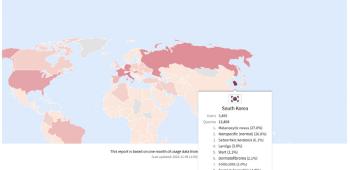Infertile Men 36% Blood Phosphate Levels Low...Affecting sperm motility
May 21, 2025
|
The study, presented at the first joint conference between the European Society for Pediatric Endocrine Studies (ESPE) and the European Society for Endocrine Studies (ESE), found that infertile men had lower blood phosphate levels than average. In addition, it was also confirmed that low phosphate concentrations reduced sperm motility.
Over the past 50 years, sperm numbers have halved worldwide, and sperm quality is also rapidly decreasing. As a result, 15% of straight couples suffer from infertility problems, with male infertility accounting for about half of all infertility cases.
However, the majority of infertile men are not clearly aware of the cause. Male infertility can be affected by a variety of factors, including genetic factors, lifestyle, nutritional status, and hormonal imbalance. Recent studies have shown that vitamin D deficiency lowers semen quality.
In response, researchers from the University Hospital of Copenhagen (Herlev) and the University Hospital of Copenhagen (Rigshospitale) in Denmark analyzed blood and semen samples from 1,242 men suffering from infertility.
The study found that 36% of infertile men had low blood phosphate levels. This is significantly higher compared to the 2% to 4% incidence in the Danish general population. In particular, men with moderate to low phosphate concentrations had fewer spermatozoa with greater motility than men with normal phosphate concentrations.
In addition, the levels of 'estradiol (17β-estradiol)', a female hormone in the blood of these men, were found to be somewhat high. However, no clear association between phosphate concentration and sperm count was found.
Dr. Sam Kafai Yayabi, who led the study, said "For the first time, we identified that the proportion of infertile men with lower blood phosphate levels was higher than that of the Danish general population." He then explained "Phosphate is a mineral that plays an important role in energy generation and bone strength maintenance, and has the potential to be a direct therapeutic target for improving reproductive function in some infertile men" and that it is also worth studying treatments with phosphate supplements"
The research team also found that phosphate plays an essential role in maintaining male reproductive function in previous studies. According to the study, the concentration of phosphate in the semen of normal men is more than 20 times higher than that of blood, and it is possible that phosphate is uniformly regulated in male reproductive organs. Therefore, the researchers are exploring the link between phosphate migration process and reproductive function through a new study.
First author Zhihui Tsui, PhD researcher at the University Hospital of Copenhagen (Herlev), says "This study suggests that phosphate concentrations in the reproductive organs may have a significant impact on the functioning of the organs and the quality of sperm, and we are currently looking for factors regulating this migration process." he said.
Dr. Kafai Yayabi "This study has raised the possibility that blood phosphate levels can affect fertility""We plan to conduct clinical trials to determine the effect of manipulating blood phosphate levels on fertility in men and women through future studies "" The research team will closely examine whether direct intervention using phosphate affects the reproductive health of women as well as men.
This article was translated by Naver AI translator.














